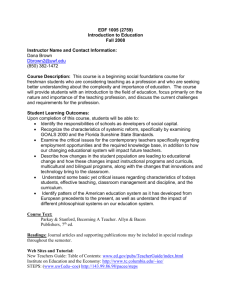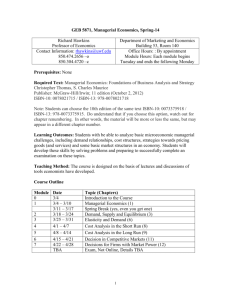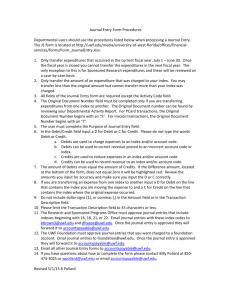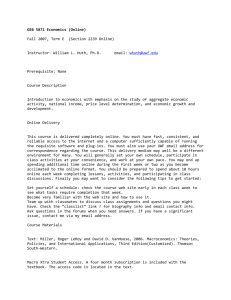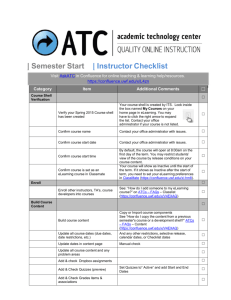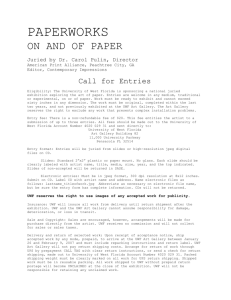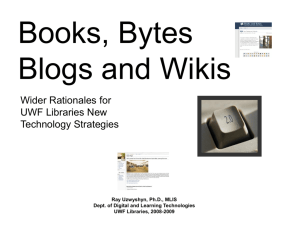NACUBO Classification Reduction
advertisement
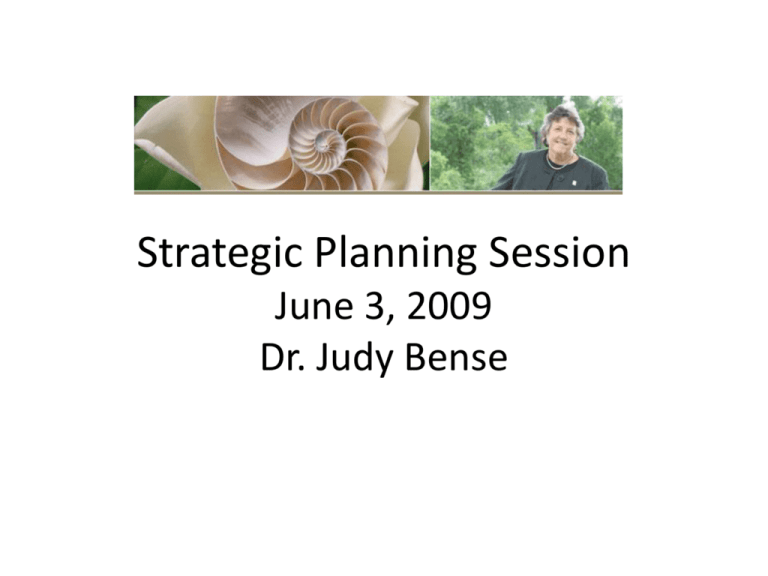
Strategic Planning Session June 3, 2009 Dr. Judy Bense Outline •Florida Outlook •UWF Budget Situation •Legislative Session •Strategic Accomplishments •Open Forum Florida Outlook General Revenue HURRICANE RECOVERY BUBBLE Dec. 2007 Federal Stimulus ? 2005 2000 7 2010 • State general revenue declined by 25% • Gap of $6 billion from last year • State University System lost recurring funds: – 07/08 $113m – 08/09 $171m – 09/10 $207m Total Recurring Reduction $491m We’re Not Alone - 2010 • • • • • • • • • • Arizona – 5% to 20% California – 10% Connecticut – 9% Georgia – 11.5% Idaho – 10% to 12% Illinois – 15% to 25% Iowa – 14.5% Louisiana – 6.6% to 11.4% Minnesota – 5% Missouri – 15% to 25% • • • • • • • • • • Nevada – 14.12% to 30% New York – 10% North Carolina – 7% North Dakota – 14% Ohio – 5% to 10% Pennsylvania – 6% South Carolina – 8% Tennessee – 13% Virginia – 15% Washington – 19% 2008-09 vs 2009-10 2008-09, Adjusted Tuition – 29% GR - 65% Lottery – 6% 10 UWF’s Financial Position Budget Planning this year • Board of Trustees Retreat Guiding Philosophies & Principles Strategic Plan Budget Input Session Budget Website Budget Assessment Report Follow the Legislative Session & Prepare for FY2010 Budget Reductions Budget Assessment Request Goals: 1. Apprise the President of the financial condition of the institution as part of the presidential transition, 2. Provide information to address potential misperceptions, confusion, and economic concerns within the campus community, 3. Provide for a transparent review of the budget cuts taken in FY08 and the overall health of the institution, 4. Establish common definitions and understandings related to budget reduction issues. Results - General •Sound financial health •All areas outlined were reviewed and addressed •All University cash is properly accounted/no duplicate counting of cash •The State Attorney General’s Office audits the University annually •We have a decentralized structure Cash •Cash levels consistent with SUS peers •Total carry forward dollars $23,348,508 as of October 1, 2008 •Total projected CF for FY2009 - $14.6 million (15.89% of the FY09 budget) •Central accounts - $3.6 million, •Hurricane funds – $4.6 million •Campus accounts - $6.4 million •Factors that lead to higher cumulative carry forward reserves 07/08 & 08/09 Budget Reductions •FY08 State mandated cuts $5 million •Reductions equal % across divisions •70 vacant positions, 22 unused positions, 16 others impacted •Additional strategic reserve ($1.59M) and divisional holdbacks ($1.96M) •Added $1M in SFTF for sustained enrollment growth •FY2009 Mid Year (4%) reduction of $2,636,438 is covered •$1,764,393 (1.89% of the of the adjusted FY09 budget) unallocated recurring budget remaining UWF Total Budget Reductions 07-08 08-09 09-10 $8,863,811 (8.73%) $2,636,483 (2.86%) $6,372,100 (7.3%) $15,555,454 17 Budget Mix Guiding Philosophies & Principles 1. The UWF Strategic Plan will guide the process. 2. Reductions will be made strategically; not across the board. 3. Instruction, direct support for instruction, student services and critical areas will receive a discounted rate of reduction. 4. The vice presidents prepared 7% and 12% reduction models. 09/10 Recurring Budget •General revenue declined 25% •UWF reduction •13% reduction to GR •2% reduction in lottery •8% tuition increase •Flexibility for additional 7% •Result is a 9% recurring reduction 20 09/10 Non-recurring flexibility • -$4.5 million federal stimulus • -Overarching principles from Feds –-Spend funds quickly to save and create jobs –-Invest thoughtfully to minimize the “funding cliff” 21 09/10 Non-recurring flexibility • $4.5 million federal stimulus –Protect jobs –Separation payouts –Strategic investments that will bring new revenue Discounting Model NACUBO Classification Reduction Direct Instruction Academic Support Student Support Public Service Research PO&M Institutional Support 5.75% 6.5% 6.75% 8% 8% 10% 10.07% 23 What this means to UWF •In 2007-8 & 2008-9; 70 vacant positions, 22 unused positions, 16 others impacted •In 2009-10 expect 26 filled lines and 39.5 vacant lines. Legislative Session • Significant legislation – Tuition bill (15% per year until reaching national average) – Graduate tuition (can increase 15% per year) – State Colleges (28 CC can offer four year degrees with DOE approval) – No pay cuts for university employees – Presidential appointment (BOT authority) • Significant Legislation – Prepaid (negotiated payment of tuition increases dependent upon prepaid reserve) – Bright Futures (refund $ for dropped courses) – Minor Projects (increase cap to $2m) – Distance Learning (statewide consortium created) – DROP (requires 6 month gap in service) Strategic Priorities and Measurable Achievements Strategic Priorities & Measurable Achievements • Requested by the BOT in August 2008 • Discussed at BOT/Senior Administration Retreat in August 2008 • Draft presented at September 2008 BOT meeting • Broad input sessions • Finalized March 2009 • Five Priorities –High Quality Academic Programs –Purposeful enrollment growth –Academic & Student Support Services –Partnership & Collaboration –Investment in People High Quality Academic Programs Provost Chula King Purposeful Enrollment Growth • • • • • Raising visibility Improving enrollment Enrolling top quality students Enhance scholarship support Provide graduates for regional workforce needs • Enhance First Generation Scholarships UMC 18-Month Timeline Creative…billboard concept Featuring President Bense with company CEOs, headline unique to industry Academic & Student Support Services Dr. Hal White, Facilities Update Dr. Debbie Ford, Student Support Services Update • • • • • • • Partnership & Collaboration FGNW, WIRED grants Federal appropriations requests President’s coalition Military Friendly School John H. Fetterman Maritime Museum Storm Ready Designation Creating Great Futures campaign Investment in People –Important priority made difficult by economic times –Chronicle of Higher Education “Great Place to Work” Open Forum
